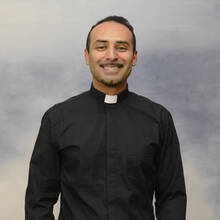To solve humanitarian crises, we need a movement of the heart
Father Tom Smolich, S.J., the international director of Jesuit Refugee Service (JRS), refers to the world’s refugee crisis as a “problem of the heart.” After 8 years at the helm of a nonprofit that serves refugees and displaced people in 59 countries, Fr. Smolich recognizes that the crisis is more than a humanitarian problem of getting resources to people that need them. The indifference of governments and international organizations, even as the number of refugees has increased, reflects a spiritual crisis, an inability to feel compassion.
Without cost you have received; without cost you are to give. (Mt 10:8)
Who awakens a sense of mission in your heart?
At this time in your life, are you facing a numbness to the cries of the world?
To what kind of prayer is your heart beginning to awaken?
Movements of the heart come to mind in this Sunday’s Gospel reading, as the church returns to Matthew’s narrative. Jesus’ compassion anchors his own mission and moves his heart to send out the Twelve on missions of their own. The opening line from today’s Gospel provides a glimpse into Jesus’ inner dialogue. “At the sight of the crowds,” writes Matthew, “Jesus’ heart was moved with pity for them…like sheep without a shepherd” (Mt 9:36). In fact, the Greek says something more earthy, “he was moved in his guts.” In the ancient world, bodily organs like the heart or bowels were the seats of different mental operations or emotions like sympathy and compassion. Jesus is “moved from within” at the sight of large crowds in need. Their presence and his response reinforce his role as a shepherd.
Only when the hearts of disciples are in sync with Christ’s can this compassion come through clearly and can the church fulfill its mission.
Throughout the opening chapters of Matthew’s Gospel, Jesus revealed his mission by teaching, healing, and preaching in the synagogues. This never-ending work seems like a recipe for burnout and emotional numbness to the plight of others. Instead, Jesus draws on the strength of his compassion from deep within to guide his role as shepherd. Divine shepherding of Israel is embedded in a long biblical tradition, as mentioned in the first reading. “You have seen for yourselves,” said the Lord to the Israelites, “how I treated the Egyptians and how I bore you up on eagle wings and brought you here to myself” (Ex 19:4). The mercy that God extends to Israelites who called out for salvation is reflected in the compassion that Jesus feels for the crowds, who call on him to serve and save them. “We are his,” writes the author from today’s psalm, “his people, the flock he tends” (Ps 100:3).
Jesus does not keep this mission to himself, but passes it to the Twelve and thereby to the church. In doing so, the metaphor shifts from pastoral to agricultural, “The harvest is abundant but the laborers are few” (Mt 9:37). Just as Jesus traveled around Israel, “teaching in their synagogues, proclaiming the gospel of the kingdom, and curing every disease and illness” (Mt 9:35), the Twelve are now to move about, like their teacher, to “cure the sick, raise the dead, cleanse lepers, drive out demons” (Mt 10:8). Their mission is one of power and authority over the powers of death.
Jesus and the first disciples let compassion pierce their own hearts and reaped great abundance. His disciples today must do the same. Whether their mission is one of accompaniment and advocacy for the plight of refugees or one that confronts other forces that harm body and soul, what sustains this awesome responsibility is the same compassion that moved the “guts” of Jesus. Unless Christ’s disciples who continue laboring for the harvest are pierced by the same cries of hurting humanity that moved him, the church will never be able to respond to its call. Only when the hearts of disciples are in sync with Christ’s can this compassion come through clearly and can the church fulfill its mission.








